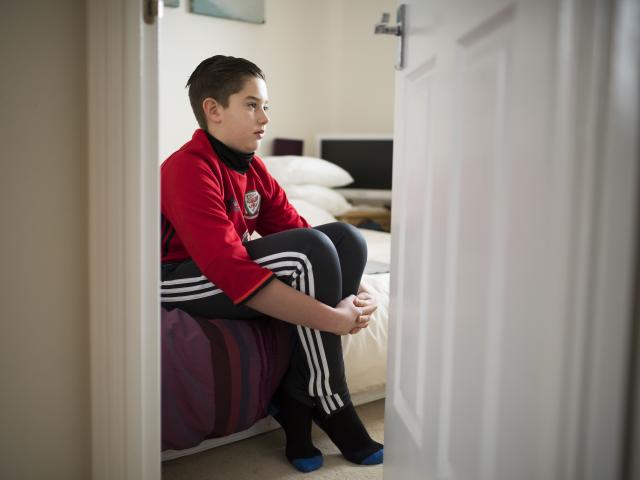
Research in Wales making a difference to the mental health of Welsh children and young people
10 February
1 in 6 children and young people have a diagnosable mental health problem, and many more struggle with challenges from bullying to bereavement. Mental health is the issue most commonly raised with the Children’s Commissioner for Wales by children, young people, and their parents and carers.
As Children’s Mental Health Week (7-13 February) gets underway, we shine a light on the importance of children and young people’s mental health and the vital research underway in Wales that aims to make a difference to hundreds of children.
Four of the research centres funded by Health and Care Research Wales, including CASCADE, DECIPHer, the National Centre for Mental Health and the National Centre for Population Health and Wellbeing Research, have work programmes focusing on the health, wellbeing and social care needs of children and young people.
Health and Care Research Wales delivers and supports research across Wales. Professor Ian Jones, a Senior Research Leader and Director of the National Centre for Mental Health champions the development and uptake of studies into mental health across Wales.
Prof Jones said: “The mental health of children and young people is equally important to that of adults, and research in this area is vital to understand the issues affecting them and what services and interventions can be put in place to support their needs. The pandemic has impacted significantly on many children’s lives, who have experienced school closures, isolation from friends and family and limited opportunities for sport and social interactions. This has heightened the already series issues surrounding children’s mental health and wellbeing.”
Research making a difference
Research study evaluates timing of parental depression on risk of child depression and poor educational attainment
This study examined the link between parental depression, and the timing of their depression (before or after the child’s birth) and outcomes for the child including depression and poor educational attainment. The results showed that children who live with a parent who has depression are more likely to develop depression and not achieve educational milestones.
Professor Sinead Brophy, Director of the Centre for Population Health, said:
“Maternal and paternal depression are both risk factors for depression in children, so it is imperative to understand the prevalence of maternal and paternal mental illness among children and its implications for child health and educational outcomes for prevention and early intervention.”
Effects of the COVID-19 pandemic on the mental health of shielded children and children living in shielded households in Wales: a data linkage study
This study compared the mental health outcomes of shielded children and children living in shielded households with children in the general population during the COVID-19 pandemic. The results revealed that in children with no history of anxiety or depression, shielded children were more likely than children in the general population to experience anxiety or depression during the pandemic in primary care.
Dr Laura Cowley, Senior Public Health Research Officer at the Centre for Population Health said:
“We have extended the study to examine anxiety and depression in children in secondary care. In addition, further analysis is underway examining anxiety and depression outcomes in clinically extremely vulnerable children in 2019, compared to the general population of children in Wales, prior to the pandemic when no shielding guidance was in place. This will help us to determine whether clinically extremely vulnerable children are at a higher risk of poor mental health regardless of the shielding intervention.”
A web-based psychoeducational intervention for adolescent depression: design and development of MoodHwb
This study informed the design and development of MoodHwb – a web-based programme to help with low mood and depression in young people and their parents/carers. Through the study, the programme was co-designed with young people and parents/carers and aimed to engage young people, promote self-help and help-seeking where appropriate.
Dr Rhys Bevan Jones, Senior Clinical Research Fellow, Cardiff University, said:
“We aim for the MoodHwb to be rolled out in schools, health services and other setting to help young people with their mood and wellbeing, and their families, carers and professionals. The co-development processes underpinning MoodHwb have also been published and will inform the development of other digital mental health technologies.”
Care-experienced children and young people’s interventions to improve mental health and wellbeing outcomes (CHIMES): systematic review
This study is bringing together existing research that has tested programmes aiming to improve the mental health and well-being of care-experienced children and young people. This will inform our understanding of what programmes work and how, and where more research is needed.
Co-production or adaption of online interventions for foster care: promoting the mental health and wellbeing of care-experienced children and young people
This study aims to understand the best ways of adapting mental health services for care-experienced young people from in-person to online/blended delivery and to understand the best ways of developing online tools.
Dr Rhiannon Evans, lead researcher at DECIPHer on both two studies commented:
“The mental health and wellbeing of care-experienced children and young people is a public health concern, with outcomes being poorer compared to the general population.
At DECIPHer we are currently undertaking a programme of research in collaboration with CASCADE and the Centre for Trials Research (CTU) to address this important issue. Presently we are reviewing the existing evidence-base for interventions, while also exploring the experiences of children and young people, parents and carers, and health and social care professionals. Drawing on our research findings, our aim is to develop and improve mental health support for individuals with experiences of care, ensuring that interventions respond to their needs and values of children and young people.”
Prof Jones continued: “It’s essential that we use the findings from research studies, such as those listed, to identify the mental health difficulties children and young people experience and use the evidence base provided by research to improve care and ultimately change lives.”